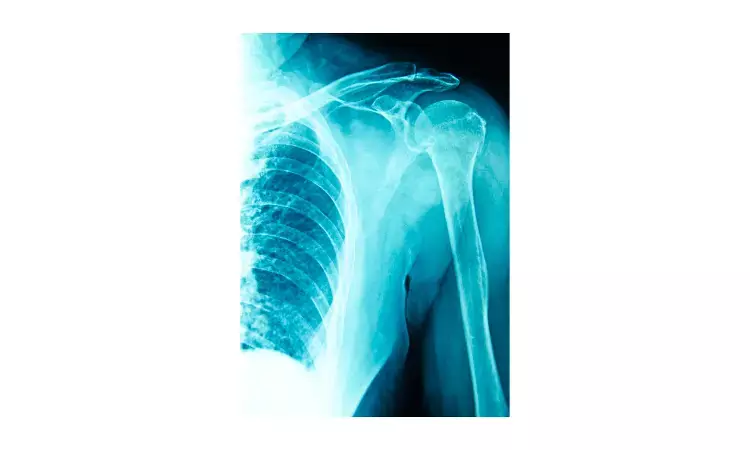- Home
- Medical news & Guidelines
- Anesthesiology
- Cardiology and CTVS
- Critical Care
- Dentistry
- Dermatology
- Diabetes and Endocrinology
- ENT
- Gastroenterology
- Medicine
- Nephrology
- Neurology
- Obstretics-Gynaecology
- Oncology
- Ophthalmology
- Orthopaedics
- Pediatrics-Neonatology
- Psychiatry
- Pulmonology
- Radiology
- Surgery
- Urology
- Laboratory Medicine
- Diet
- Nursing
- Paramedical
- Physiotherapy
- Health news
- Fact Check
- Bone Health Fact Check
- Brain Health Fact Check
- Cancer Related Fact Check
- Child Care Fact Check
- Dental and oral health fact check
- Diabetes and metabolic health fact check
- Diet and Nutrition Fact Check
- Eye and ENT Care Fact Check
- Fitness fact check
- Gut health fact check
- Heart health fact check
- Kidney health fact check
- Medical education fact check
- Men's health fact check
- Respiratory fact check
- Skin and hair care fact check
- Vaccine and Immunization fact check
- Women's health fact check
- AYUSH
- State News
- Andaman and Nicobar Islands
- Andhra Pradesh
- Arunachal Pradesh
- Assam
- Bihar
- Chandigarh
- Chattisgarh
- Dadra and Nagar Haveli
- Daman and Diu
- Delhi
- Goa
- Gujarat
- Haryana
- Himachal Pradesh
- Jammu & Kashmir
- Jharkhand
- Karnataka
- Kerala
- Ladakh
- Lakshadweep
- Madhya Pradesh
- Maharashtra
- Manipur
- Meghalaya
- Mizoram
- Nagaland
- Odisha
- Puducherry
- Punjab
- Rajasthan
- Sikkim
- Tamil Nadu
- Telangana
- Tripura
- Uttar Pradesh
- Uttrakhand
- West Bengal
- Medical Education
- Industry
Subacromial decompression no better than other therapies for return to work in shoulder impingement

Arthroscopic subacromial decompression is one of the most commonly performed shoulder surgeries to treat patients with suspected shoulder impingement syndrome, i.e subacromial pain syndrome.
A randomized trial by Mathias Back and team revealed that arthroscopic subacromial decompression showed no benefit over diagnostic arthroscopy or exercise therapy on return to work in patients with shoulder impingement syndrome.
The findings of the study are published in BMC Musculoskeletal Disorders.
The objective of the study was to assess return to work and its predictors in patients with shoulder impingement syndrome in a secondary analysis of a placebo-surgery controlled trial as post operative studies are limited.
The study was a randomised trial that included 184 patients, 57 had arthroscopic subacromial decompression, 59 had diagnostic arthroscopy, 68 had exercise therapy. Return to work, was assesed at least two follow-up visits by the primary 24-month time point, work status at 24 and 60 months, and trajectories of return to work per follow-up time point was mantained. The full analysis set as the difference between the groups in return-to-work rates and work status at 24 months and 60 months using Chi-square test and the predictors of return to work with logistic regression analysis was assessed.
The results of the study were
• There was no difference found in the trajectories of return to work between the study groups.
• By 24 months, 50 of 57 patients (88%) had returned to work in the arthroscopic subacromial decompression group, while the respective figures were 52 of 59 (88%) in the diagnostic arthroscopy group and 61 of 68 (90%) in the exercise therapy group.
• No clinically relevant predictors of return to work were found. The proportion of patients at work was 80% (147/184) at 24 months and 73% (124/184) at 60 months, with no difference between the treatment groups (p-values 0.842 and 0.943, respectively).
Back and team concluded that "Arthroscopic subacromial decompression provided no benefit over diagnostic arthroscopy or exercise therapy on return to work in patients with shoulder impingement syndrome. We did not find clinically relevant predictors of return to work either."
Reference:
Bäck, M., Paavola, M., Aronen, P. et al. Return to work after subacromial decompression, diagnostic arthroscopy, or exercise therapy for shoulder impingement: a randomised, placebo-surgery controlled FIMPACT clinical trial with five-year follow-up. BMC Musculoskelet Disord 22, 889 (2021). https://doi.org/10.1186/s12891-021-04768-7.
Medical Dialogues consists of a team of passionate medical/scientific writers, led by doctors and healthcare researchers. Our team efforts to bring you updated and timely news about the important happenings of the medical and healthcare sector. Our editorial team can be reached at editorial@medicaldialogues.in.
Dr Kamal Kant Kohli-MBBS, DTCD- a chest specialist with more than 30 years of practice and a flair for writing clinical articles, Dr Kamal Kant Kohli joined Medical Dialogues as a Chief Editor of Medical News. Besides writing articles, as an editor, he proofreads and verifies all the medical content published on Medical Dialogues including those coming from journals, studies,medical conferences,guidelines etc. Email: drkohli@medicaldialogues.in. Contact no. 011-43720751


